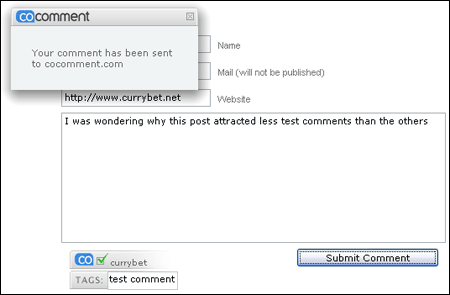coComment - a solution to a problem I didn't know I had? - part two
Yesterday I started looking at a public beta of a system called coComment, which seems to be a solution to a problem that I wasn't aware I had - that I can't currently follow the response to any comments I have left around the web without clicking back on all of the sites.
From an architecture point of view they seem to have a nice balance in the system. Although they need a central architecture to maintain the "your conversations" pages and widgets, the development on the system already seems fairly well distributed across different blogging platforms, with different communities of interest producing greasemonkey scripts and bookmarklets for the tool.
Where I would be concerned would be how the system scales up to cope with spam. You only have to make a quick search on Technorati for a competitive keyword like 'Crete' to see how many drone content scraper blogs are out there, and I would have thought that trying to generate clicks from the coComment social sharing and neighbourhood features would be an obvious target.
I haven't really explored the more social connection side of the system. For a given blog coComment aggregates information like the users who have left the most comments. On your individual profile page you are also given an idea of your 'neighbours' - i.e. people who leave "coComments" on the same blogs, or similar blogs, to the ones you do. These kind of peer review features are one of the ways coComment hope to cope with the problem of 'spam'.
Whilst the distributed nature of the comment collection has its strengths, there is also an inherent weakness. Due to the inexorable rise of comment spam most blog systems now include some kind of verification system or post-moderation of comments. Currently coComment doesn't appear to carry out any verification itself that comments submitted have actually been published.

This means that I can leave a coComment tagged comment on my Typepad powered blog, delete it from the Typepad control panel, but still see it appearing in my coComment conversations list. Again scalability might be an issue, but perhaps they need to consider a feature that pings back a blog, maybe 48 or 72 hours after a comment is submitted, to verify that it has actually been published.
Despite these potential issues, I understand from coComment that they have already seen adoption of the system by users who have enough English to use the system as it currently stands, but who use a different language as their primary language when leaving comments. The team are now actively pursuing a programme of providing localised versions of coComment for non-English speakers. Sadly, my Greek isn't anywhere near good enough yet to help them out with that ;-)
The biggest drawback I find is that even though I'm really keen to try it out, and can see some real uses in tracking comments, I still find I keep forgetting to click the little bookmarklet. I think the best chance of coComment gaining widespread adoption is if blog owners can be persuaded to already include the form in their pages - and I guess that means convincing the big players to ship it as an option in their default templates.
Hey Martin,
thanks for the analysis. We're really looking at spam (would be irresponsible not to right ;-) and we have a couple of actions coming in the next releases, namely:
- akismet integration
- crawling, and the spider will warn us if we publish a comment that has been removed (what we do afterwards is currently discussed, in some cases it's really cool to have the coComment trail - when one of your comment has been abusively deleted for ex)
- some other measures are also considered at this point.
Also, if you use Firefox you can install our extension - http://www.cocomment.com/tools/extension - that will save you from having to click on that bl***** bookmarklet ;-) The IE extension is in the pipe but we're thinking of organizing a little contest around that rather than doing it directly.
And thanks for the feedback, don't hesitate, that kind of constructive remarks are very valuable for us to know what we need to put our energy on!
The Firefox extension does get rid of the problem to do with remembering to hit the bookmarklet - but it does need a bit of handholding at times!